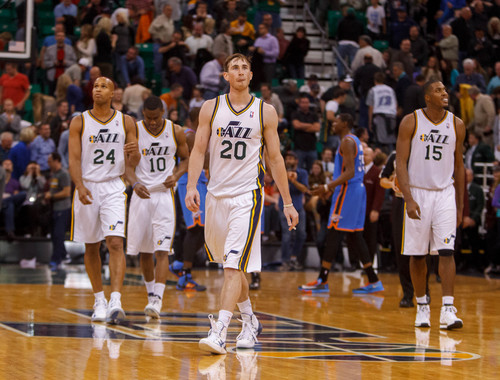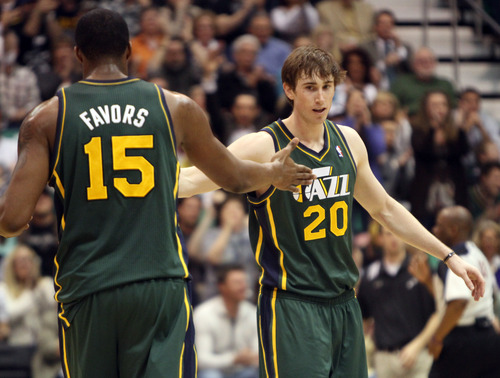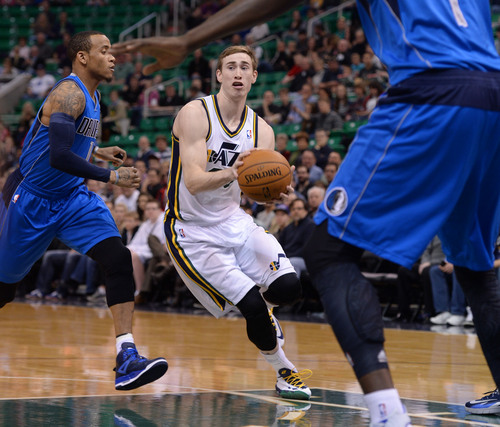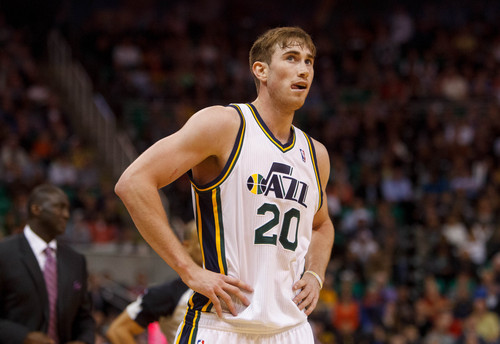This is an archived article that was published on sltrib.com in 2014, and information in the article may be outdated. It is provided only for personal research purposes and may not be reprinted.
This column will violate only three journalistic principles, but that's just because of the word limit.
Skipping to the end, Gordon Hayward will stay with the Jazz. That's the only acceptable conclusion to his restricted free agency, and the Jazz can control the outcome. So whether Hayward signs a new contract with the Jazz or they match the offer sheet he signs with another club, he's coming back to Utah for a fifth season and beyond.
That's the ending I'm endorsing, which breaks the following rules:
No. 1 • Always cheer for the best story.
For the sake of intrigue, the top destinations for Hayward would be Boston and Phoenix, with the Jazz, Cleveland, Charlotte or anywhere else a distant third.
Hayward's reunion in Boston with Brad Stevens, his former Butler University coach, would be good stuff. Nobody knows how to utilize him better than Stevens, and Hayward is a classic case of a player who performs his best when he's completely comfortable with a system and his role in it.
Playing for former Jazz assistant coach Jeff Hornacek in Phoenix also would do wonders for Hayward. He would be freed up in the Suns' style of play and would respond well to Hornacek's confidence in him.
As logical as those landing spots seem, though, acquiring Hayward would require some machinations by the Celtics and some failed efforts in the Suns' pursuit of higher-tier free agents — plus the Jazz's cooperation — to make it happen.
No. 2 • Have an original opinion, not a response.
When the news broke that Cleveland might … potentially … conceivably … offer Hayward a four-year, maximum contract that the Jazz would have to consider matching, the reaction was fascinating to me.
Somehow, many fans seemed to believe they were being asked to spend their own money, donating to the Gordon Daniel Hayward Fund. They were endorsing fiscal responsibility, which is usually a good thing. But in free agency, another team can set the market price for a player. It's not as if some committee is determining his value.
The Jazz risked having to overpay Hayward this summer by not signing him to an extension in October, but having to do so hardly would be catastrophic. The Jazz have to reach a minimum payroll figure, for one thing. So would you rather have them pay Hayward, or a few guys with bloated contracts who never play?
The real issue is if the Jazz let Hayward leave, who out there is a viable, realistic replacement?
No. 3 • Never overtly favor the home team.
My rationalization is I'm taking this position on behalf of Jazz fans, even those who worry about a Hayward contract hamstringing the franchise in the Andrei Kirilenko tradition.
The Jazz have to keep Hayward, because they must give coach Quin Snyder a decent chance of succeeding in his first season, and because there would enough money for the Jazz to keep building in the next four or five years.
By adding rookies Dante Exum and Rodney Hood and complementary player Steve Novak and subtracting Hayward, the Jazz would have a worse roster in 2014-15. And who wants to witness another 25-57 season? I'd love to see how Snyder could maximize Hayward's skills in a faster-paced offense.
Hayward never will be the best player on a great team, but he can be a good player on a good team in Utah someday. The Jazz have invested a lot of effort into Hayward's development, and there's more to be done.
The next phase just requires more money - theirs, not ours, thankfully.
Twitter: @tribkurt

















